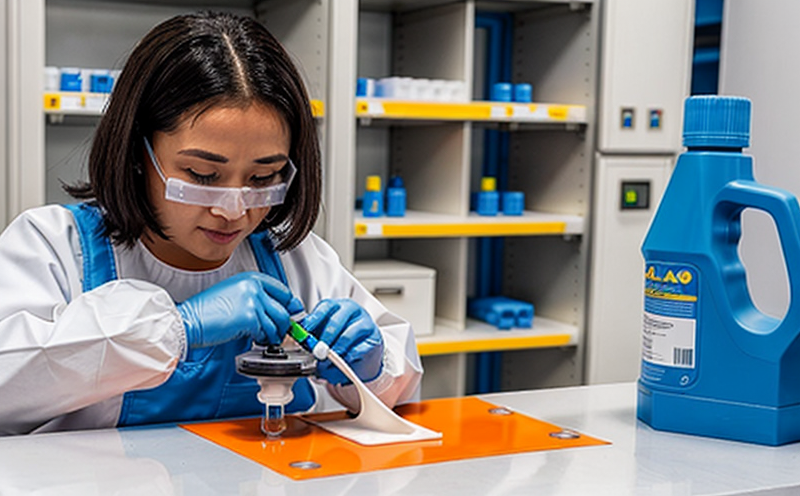DIN EN 1465 Shear Strength Testing of Structural Adhesives with Nanoparticles
The DIN EN 1465 standard is a cornerstone in the evaluation of structural adhesives, particularly focusing on shear strength testing. This test is crucial for quality managers and compliance officers who need to ensure that their products meet stringent international standards. The inclusion of nanoparticles in these adhesives adds an additional layer of complexity, as it requires precise methodologies tailored to capture the unique properties introduced by nanotechnology.
The DIN EN 1465 standard outlines a series of tests designed to evaluate the shear strength of structural adhesives under specified conditions. Shear strength is critical in understanding how well an adhesive can withstand forces that tend to cause it to slide along its bonded surfaces, which is essential for products used in high-stress applications such as aerospace and automotive manufacturing.
When nanoparticles are introduced into the adhesive formulation, they can significantly alter the mechanical properties of the material. This includes improvements in shear strength, adhesion, and toughness. The challenge lies in accurately measuring these changes without compromising the integrity of the test specimens. This is where specialized testing laboratories like Eurolab come into play.
Our approach involves rigorous specimen preparation, which is critical to ensuring accurate results. Specimens are cut from adhesive joints that have been bonded under controlled conditions. The choice of substrate and the method of bonding can significantly affect the outcome, hence meticulous attention is paid to these details. Once prepared, the specimens undergo shear strength testing using a universal testing machine (UTM) equipped with appropriate fixtures.
The test involves applying a known force at a specified rate until failure occurs. The maximum load before failure is recorded as the shear strength. For DIN EN 1465, this process must be conducted under controlled environmental conditions to ensure that variables such as temperature and humidity do not influence the results. This ensures consistency across different batches of adhesives.
The use of nanoparticles introduces additional considerations in specimen preparation and testing. The particle size and distribution can affect the bonding characteristics of the adhesive, requiring careful calibration of test parameters. Our laboratory uses advanced microscopy techniques to visualize nanoparticle dispersion within the adhesive matrix, ensuring that our tests are not only accurate but also reflective of real-world conditions.
The results from these tests provide critical data for quality assurance and compliance officers. They help in identifying any potential issues with the adhesive formulation early in the development process, allowing for timely corrections. This is particularly important in the context of nanotechnology, where small changes can have significant impacts on performance.
Our laboratory adheres strictly to DIN EN 1465 standards, ensuring that all tests are conducted under controlled conditions and reported accurately. This commitment to precision and reliability makes our services invaluable for R&D engineers who need to innovate within the constraints of international standards. For procurement professionals, these tests offer a robust basis for selecting suppliers whose products meet the highest quality benchmarks.
The introduction of nanoparticles into adhesives presents both opportunities and challenges in terms of testing methodologies. Our expertise lies in overcoming these challenges by providing accurate and reliable shear strength testing results. This service is not only aligned with DIN EN 1465 but also supports broader compliance requirements across various sectors, including aerospace, automotive, and construction.
Eurolab Advantages
At Eurolab, we pride ourselves on offering unparalleled expertise in the field of nanomaterials testing. Our team of highly qualified professionals ensures that every test is conducted with precision and accuracy, adhering strictly to international standards such as DIN EN 1465.
- Precision Equipment: We utilize state-of-the-art universal testing machines equipped with specialized fixtures for shear strength testing.
- Advanced Microscopy: Our laboratories are equipped with advanced microscopy techniques, allowing us to visualize nanoparticle dispersion within the adhesive matrix accurately.
- Controlled Environment: All tests are conducted in controlled environmental conditions to ensure consistency and reliability of results.
- Comprehensive Reporting: We provide detailed reports that not only include test results but also insights into potential areas for improvement based on the data gathered.
Our commitment to quality is further reflected in our certifications and accreditations, ensuring that all services meet or exceed international standards. This level of expertise and precision makes Eurolab the preferred choice for companies looking to ensure the highest standards of quality in their products.
International Acceptance and Recognition
DIN EN 1465 is widely recognized across Europe and internationally, ensuring that tests conducted under this standard are accepted globally. The list of countries that accept DIN EN 1465 includes:
- Austria
- Belgium
- Czech Republic
- Denmark
- Estonia
- Finnland
- Greece
- Hungary
- Ireland
- Italy
- Luxembourg
- Netherlands
- Poland
- Slovakia
- Slovenia
- Spain
- Sweden
- Switzerland
- Turkey
- The United Kingdom (adopted as EN 1465)
This widespread acceptance underscores the importance of adhering to this standard, especially for companies operating in multiple jurisdictions. Our laboratory ensures that all tests are conducted according to DIN EN 1465, thereby facilitating seamless compliance with international standards.
Environmental and Sustainability Contributions
The use of nanomaterials in adhesives can contribute positively to environmental sustainability by enhancing the durability and performance of products. This is particularly relevant for industries like construction and automotive manufacturing, where long-lasting materials are crucial.
DIN EN 1465 testing plays a vital role in ensuring that these nanocomposites perform optimally under real-world conditions. By providing accurate shear strength data, we help manufacturers make informed decisions about the use of nanoparticles, ultimately leading to products with enhanced durability and reduced lifecycle costs.
Our commitment to sustainability is further reflected in our efforts to minimize waste during specimen preparation and testing processes. We adhere strictly to environmental best practices, ensuring that our laboratory operations are as eco-friendly as possible.





